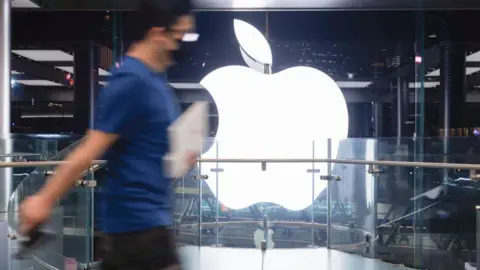
Two US lawmakers have strongly criticized the UK's "dangerous" and "shortsighted" request to access encrypted data stored by Apple users worldwide in its cloud service.
Senator Ron Wyden and Congressman Andy Biggs have written to National Intelligence Director Tulsi Gabbard, stating that this demand threatens the privacy and security of the US.
They urge her to give the UK an ultimatum: "Back down from this dangerous attack on US cybersecurity, or face serious consequences."
The BBC has reached out to the UK government for comment.
"While the UK has been a trusted ally, the US government must not allow what is effectively a foreign cyberattack carried out through political means," the US politicians wrote.
If the UK does not back down, Ms. Gabbard should "reevaluate US-UK cybersecurity arrangements and programs, as well as US intelligence sharing," they suggest.
What is the UK seeking? The request for the data emerged last week.
It applies to all content stored using what Apple calls "Advanced Data Protection" (ADP).
This uses end-to-end encryption, where only the account holder can access the stored data. Apple itself cannot see it.
It is an opt-in service, and not all users choose to activate it.
The demand was first reported by the Washington Post, quoting sources familiar with the matter, and the BBC has spoken to similar contacts.
The Home Office said then: "We do not comment on operational matters, including, for example, confirming or denying the existence of any such notices."
Apple declined to comment, but states on its website that it views privacy as a "fundamental human right."
The order was issued by the Home Office under the Investigatory Powers Act, which requires companies to provide information to law enforcement agencies.
According to the law, the Home Office's request cannot be made public. Senator Wyden and Congressman Biggs argue that agreeing to the request would "undermine Americans' privacy rights and expose them to espionage by China, Russia, and other adversaries."
They point out that Apple does not create different versions of its encryption software for each country, so Apple customers in the UK use the same software as those in the US.
"If Apple is forced to create a backdoor in its products, that backdoor will end up in Americans' phones, tablets, and computers, compromising the security of Americans' data, as well as the data of countless federal, state, and local government agencies that trust Apple products with sensitive information."
The UK government's action has shocked experts and alarmed privacy advocates, with Privacy International calling it an "unprecedented attack" on individuals' private data.
